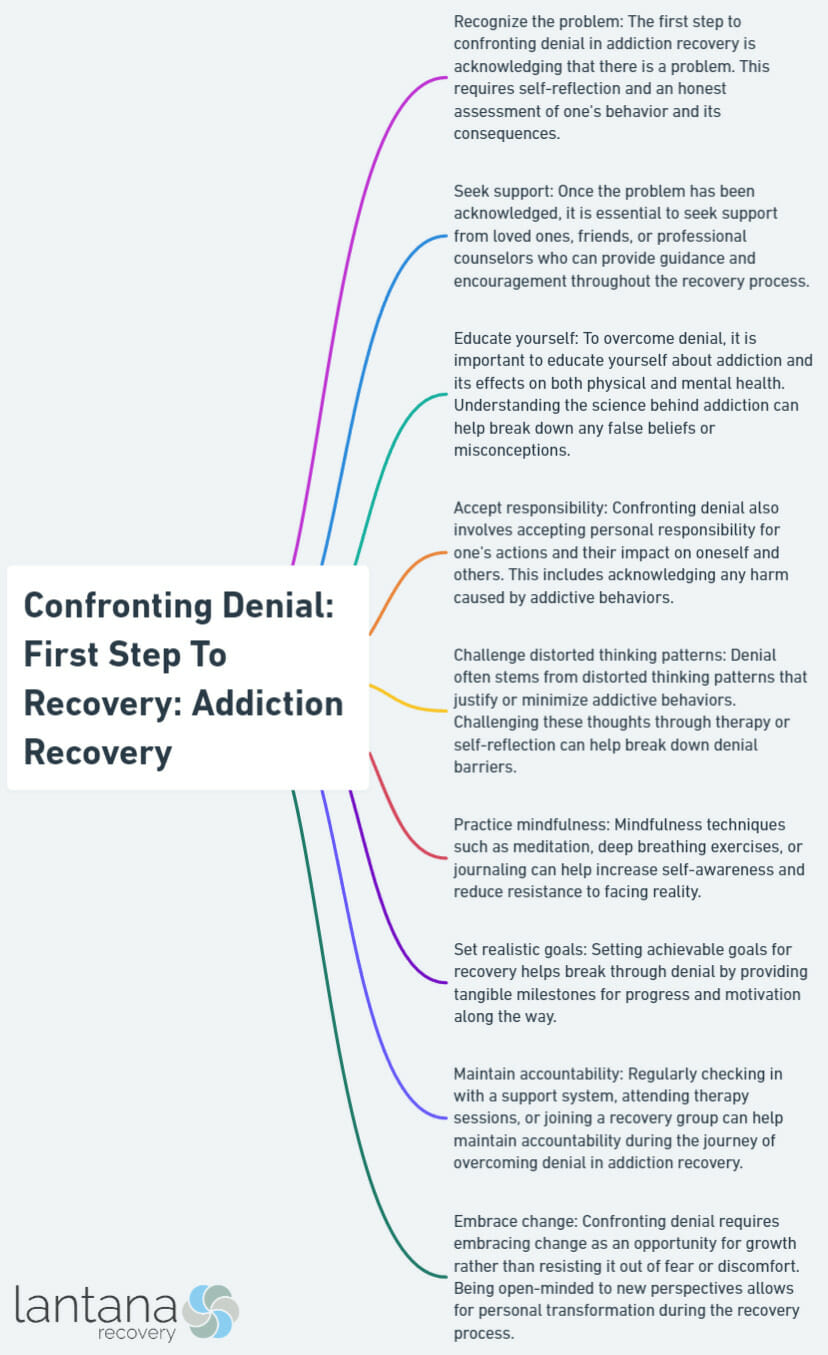Denial is a powerful force that can keep someone trapped in the destructive cycle of addiction. It’s like a thick fog, clouding one’s vision, making it difficult to see the reality of their situation. But what if we told you that cutting through this fog is the key to unlocking a world of healing and recovery? In this blog post, we’ll explore the complex world of addiction denial, its various forms, and how confronting it is the crucial first step towards recovery, or as some might say, the “denial first step to recovery.”
Join us as we dive into the different types of denial, recognize the signs, and provide guidance on overcoming this obstacle. We’ll also discuss the role mental health plays in denial and the importance of addressing it throughout the recovery process. Whether you’re seeking help for yourself or supporting a loved one, this comprehensive guide will provide valuable insights and practical advice to help navigate the challenges of addiction denial and recovery, keeping in mind that the first step to recovery is a vital concept to embrace.
Key Takeaways
- Understanding addiction denial is essential for successful recovery.
- Breaking through denial requires acknowledgement, acceptance and dedication to healing.
- Mental health issues must be addressed in order to cope with relapse and foster long-term success.
Understanding Denial in Addiction

Addiction denial refers to the psychological phenomenon of individuals with a substance use disorder failing to acknowledge their condition. Like an invisible shield, it protects them from the harsh reality of their drug or alcohol use, allowing them to continue engaging in substance abuse despite the detrimental consequences. Denial can impede the recovery process by preventing individuals from recognizing their addiction and seeking assistance.
When left unmanaged, substance use disorders, including alcohol abuse and drug abuse, can become persistent, worsening issues that result in negative consequences such as overdose, long-term medical or mental health complications, and may even lead to death. Denial acts as a defense mechanism, allowing those battling addiction to evade the harsh reality of their problem, thus delaying the onset of recovery, which begins with acknowledgement and acceptance.
Types of Addiction Denial

To tackle addiction denial effectively, it’s vital to understand its two distinct forms: Type A and Type B. These types play a significant role in shaping an individual’s perception of their addiction and their willingness to seek treatment. Type A denial is characterized by an individual’s refusal to acknowledge the existence of an individual.
Type A Denial
Type A denial occurs when individuals are aware of their drug addiction but lie about it to others. This type of denial can lead to feelings of guilt and shame, difficulty in obtaining assistance, and a lack of support from family and friends. It’s a hidden struggle, as the person grappling with addiction keeps their problem under wraps, often making unsuccessful attempts to quit on their own.
It is important for individuals to admit their addiction and be receptive to help in order to conquer Type A denial. Seeking professional assistance, such as residential treatment, and garnering support from family and friends can make a significant difference in breaking through Type A denial and starting the recovery process.
Type B Denial
Type B denial, on the other hand, is when individuals genuinely do not believe they have an addiction and attempt to justify their behavior. This form of denial is characterized by self-deception and rationalization, where the individual remains unaware of their addiction or problem and conceals it through various means.
Signs of Type B denial can include minimizing the issue, assigning blame to others, or disregarding the potential consequences of their actions. Addressing Type B denial requires introspection, professional assistance from experts at Lantana Recovery, and establishing a support network. Acknowledging and accepting the issue forms the first step in breaking away from this denial and stepping onto the path of recovery.
Recognizing Signs of Addiction Denial

Identifying and addressing addiction denial in oneself or others requires a keen awareness of common indicators, including downplaying the issue, shifting blame, and evading discussions about addiction. Familiarizing oneself with the DSM-5 criteria for addiction, a widely accepted classification of mental disorders used by mental health professionals can also help in recognizing the signs of addiction denial.
Indications of addiction denial include:
- Minimizing or understating the degree of the addiction issue
- Providing justifications or rationalizing the addictive conduct
- Attributing others or external elements to the addiction
- Evading dialogues or conversations about addiction
- Becoming defensive or antagonistic when confronted about the addiction
Identifying these signs can pave the way for addressing denial and initiating the recovery process.
Breaking Through Denial: The First Step in Recovery

Breaking through denial forms the first step in the recovery process, paving the way for individuals to acknowledge their addiction and seek help. Breaking through denial can be challenging, but it’s often the most influential initial step toward healing. One strategy to help someone overcome denial is to suggest that they maintain a confidential and truthful log of their alcohol and substance consumption. This can help the individual objectively assess their behavior and confront the reality of their addiction.
Another approach is to introduce the concept of addiction therapy gradually as well as resources like prevention classes and evaluate the person’s reaction. If they appear open to the idea, arrangements can be made to assist them in their recovery process. In case of reluctance, it’s advisable to step back and revisit the topic at a more opportune time. Patience and persistence are key when it comes to breaking through denial and starting the journey to recovery.
Navigating the Stages of Addiction Recovery

Recovery is a phased journey that encompasses acknowledgment, acceptance, and maintenance. Addressing denial in each stage is crucial in recognizing the issue and comprehending the effects of dependence on one’s life.
Acceptance and dedication to healing are essential elements that can assist with long-term recovery. By understanding and navigating these stages, individuals can develop a strong foundation for a successful recovery journey.
Stage One: Acknowledgment
In the first stage of recovery, acknowledgment, individuals must recognize their addiction and its effects. This stage often involves a range of emotions, such as guilt, shame, and the inclination to downplay the severity of the addiction. Overcoming denial in this stage enables individuals to see their addiction for what it is and acknowledge the consequences of their substance use.
Education plays a significant role in overcoming stage one denial. Loved ones can help by providing information about addiction and encouraging the individual to understand that the definition of an addict applies to them. This recognition paves the way for the next stage of recovery: acceptance.
Stage Two: Acceptance
Stage two of recovery, acceptance, is all about acknowledging the need for assistance and obtaining professional treatment. It’s during this stage that individuals come to terms with the fact that they cannot overcome their addiction alone and that seeking help is essential. Overcoming stage two denial may involve:
- Attending mutual help group recovery meetings
- Consulting with a therapist
- Conversing with individuals in recovery
- Confiding in a physician
- Investigating recovery resources
By accepting their addiction and the need for help, individuals can take a significant step towards healing and long-term recovery.
Stage Three: Maintenance
The third stage of recovery, maintenance, focuses on:
- Sustaining abstinence
- Thwarting relapse by confronting denial throughout the recovery journey
- Continuing to address any lingering denial
- Remaining vigilant against the potential return of addictive behaviors
To successfully navigate the maintenance stage, individuals should:
- Remain engaged in their addiction recovery program
- Foster connections with support groups and loved ones
- Be mindful of the improvements in their life since achieving sobriety
By consistently addressing denial and maintaining a strong support network, individuals can enhance their prospects of long-term recovery and a healthier, happier life.
Supporting a Loved One Struggling with Denial

As stated in Social Support in Patients Undergoing Treatment for SUDs by Birkeland et al., 2021, family and other social connections can play a vital role in assisting patients in dealing with the practical and emotional challenges of illnesses. When supporting a loved one struggling with addiction denial, here are some tips to keep in mind:
- Provide clear communication and share accessible resources.
- Approach discussions with empathy and understanding, avoiding judgment or blame.
- Encourage open and honest conversations about their addiction and its consequences.
Inviting someone who has gone through addiction to communicate with your loved one may provide them with a sense of understanding and relatability. Additionally, offering information about treatment programs and support groups can help your loved one explore their options for overcoming denial and starting the recovery process.
Treatment Options for Overcoming Addiction Denial

A myriad of treatment programs and support groups exist to assist individuals battling denial and addiction as well as prevent relapse. These resources can provide guidance, education, and a sense of community to those seeking recovery. Some options include 12-step programs like Alcoholics Anonymous and Narcotics Anonymous, cognitive-behavioral therapy, and residential treatment programs.
It’s essential for individuals to explore these options and find the treatment program or support group that best suits their needs. By engaging in these resources, individuals can gain valuable tools and insights to help them overcome denial, address their addiction, and build a strong foundation for a successful recovery journey.
The Role of Mental Health in Addiction Denial

The complex interplay between mental illness and addiction denial underscores the importance of addressing underlying mental health problems during recovery. “Substance use disorder (SUD) is associated with a high risk of physical and mental illness such as anxiety, depression, personality disorders, eating disorders, and abnormal mood changes” (The impact of SUD on mental health, Kim et al., 2020.) Recognizing and treating mental health conditions like depression, anxiety, or bipolar disorder can significantly impact the success of addiction recovery.
Addressing underlying mental health issues during the recovery process can help decrease the likelihood of relapse and enhance the prospects for successful recovery. By prioritizing mental health along with addiction treatment, individuals can develop a comprehensive approach to healing that addresses both the visible and invisible aspects of their struggle.
Coping with Relapse and Denial

During the recovery journey, relapse and denial can pose formidable challenges. However, self-forgiveness and continued support are paramount for individuals to manage these setbacks and continue moving forward. Recognizing that missteps are part of the healing process and granting oneself absolution for mistakes can be essential for maintaining motivation and progress.
To ensure continued support during the recovery journey, individuals should connect with family and friends, attend support groups, and consult professional help when needed. By practicing self-forgiveness and maintaining a strong support network, individuals can better cope with relapse and denial, ultimately enhancing their chances of long-term recovery.

Summary
Throughout this blog post, we’ve explored the complex world of addiction denial, its various forms, and the importance of confronting it as the first step toward recovery after understanding addiction relapse. From understanding denial to recognizing its signs, and offering guidance on overcoming it, we’ve provided valuable insights and practical advice for navigating the challenges of addiction denial and recovery.
As we’ve seen, the road to recovery is a journey filled with obstacles and setbacks, but with determination, self-forgiveness, and continued support, individuals can overcome denial and build a strong foundation for a successful recovery. Remember, the first step to healing is acknowledging the problem and seeking help. Together, we can break through the fog of denial and embrace a brighter, healthier future.
Frequently Asked Questions
What are the 5 steps of recovery denial?
The five stages of recovery denial according to Kübler-Ross are denial, anger, bargaining, depression, and acceptance. These emotions may not necessarily occur in a specific order, and individuals can experience multiple stages at once. Understanding these stages is essential in order to gain perspective on the grief process and cope with it.
What is the first step in recovery?
The first step in recovery is, to be honest with ourselves about our inability to beat our addiction alone and to admit that our lives have become unmanageable. We must then reach out for help and support from others who have gone through the same struggles and have found a way to overcome them. This could be through attending support groups, talking to a therapist, or even just talking to a friend or family member.
What are the 4 steps in the recovery process?
The four stages of recovery from addiction are recognizing the problem, seeking treatment, developing an action plan, and maintaining sobriety. Recognizing the problem is the first step in recovery. It involves acknowledging the addiction and its effects on one’s life. Seeking treatment is the next step, which can involve therapy, medication, or both. Developing a business.
How do you overcome denial in recovery?
Break through denial by avoiding confrontation while under the influence, sticking to facts, documenting behaviors, being persistent, and bringing in reinforcements. Reach out for support from fellow peers in recovery, a therapist, or recovery meetings.
What are the two types of addiction denial?
Type A denial involves lying about addiction, while Type B denial involves denying and justifying it. Both types of denial can be damaging to an individual’s recovery process, as they can prevent them from seeking help and getting the treatment they need.









